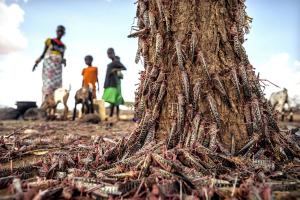Sustainable Alternatives to Organophospates Could Save Biodiversity and Livelihoods, Finds TMG Study
Comprehensive analysis of campaigns to eradicate desert locust swarms in eastern Africa uncovers devastating costs to environment and crucial honey sector.
BERLIN, GERMANY, March 22, 2023 /EINPresswire.com/ -- Researchers at TMG Research gGmbH - a Berlin-based sustainability think tank - have published an empirical study of the impact of organophosphate campaigns to fight desert locust invasions in eastern Africa. Titled, 'Insecticide Use against Desert Locust in the Horn of Africa 2019–2021 Reveals a Pressing Need for Change,' the peer-reviewed study was published in Agronomy journal on 10 March 2023.The scale of the invasion – and subsequent choice of control measures – was magnified by an unprecedented breeding due to changing climate conditions. Due to the inaccessible location of the breeding grounds, the scale of the threat was discovered too late and countries were left with little choice but to use highly toxic chemical pesticides. However, this had severe impacts on honey bees and other pollinators, indicating that valuable biodiversity was destroyed by the campaign.
Animal pollinators, mostly insects, play a critical role in food production and biodiversity health. In the case of Ethiopia, control measures led to an officially reported 78% decline in honey production, equating to a loss of US$500 in revenue. In addition, ecosystem services provided by bees are estimated to be worth more than 15 times the value of honey and other hive products combined. Tallying the cost of recolonizing empty beehives as well as mortality of wild pollinators, the “true costs” of the organophosphate campaign is likely to be in the realm of billions of dollars.
The consequences for Ethiopia’s valuable honey sector have been catastrophic: an estimated 76 billion honeybees either perished or abandoned their hives all together, plummeting honey production from a peak of nearly 70,000 tonnes in 2017-18 to just over 10,000 tonnes in 2021 (FAOSTAT). Similar impacts were revealed by a comprehensive study in Senegal, commissioned by the Food and Agriculture Organization of the UN (FAO) in the aftermath of the 2003-2005 Western African plague.
In recent years, much of the Horn of Africa and parts of Western Asia have experienced unprecedented outbreaks of desert locust, forcing them to resort to the use of organophosphates to decisively eliminate the threat. In 2020, Kenya was confronted by an unfathomable locust swarm spanning 2,400 km2 – equal to the area of Luxembourg – with a potential density of 80 million individuals per km2 (or nearly 200 billion locusts in total). Since a locust can eat as much as its own body weight of 2 grammes per day, this particular swarm had the theoretical potential to devour upwards of 384,000 tonnes of vegetation daily, including pastures and food crops, with disastrous consequences for the maize harvest – an important staple crop.
Had countries an access to better early warning systems, such drastic action might have been avoided. In light of expected climate-induced increases in intensity and frequency of locust outbreaks in future, it is imperative that more sustainable approaches to manage pest invasions at national and international level are explored as a matter of urgency.
The study calls on affected countries, and international support agencies, to urgently embark on a set of interrelated measures to prevent the use of highly toxic chemical pesticides in future.
1. Invest in intelligent early warning and action systems to identify locust breeding sites pre-empting the use of widespread pesticide campaigns
2. Launch an urgent independent scientific enquiry into the high mortality of honeybees in both Ethiopia and Kenya, which should also address the mortality of wild bees and other non-target organisms – on land, air and in water bodies.
3. Pursue a ban on the use of organophosphates.
4. In tandem with early action, explore safer biopesticide alternatives, such as a recent successful campaign in Somalia.
5. Support countries and international organiations to develop a new governance to manage climate related pests and diseases.
Note for Editors
These findings are contained in the following newly published TMG scientific study, published in Agronomy journal:
Mullié, W.C.; Prakash, A.; Müller, A.; Lazutkaite, E. Insecticide Use against Desert Locust in the Horn of Africa 2019–2021 Reveals a Pressing Need for Change. Agronomy 2023,13,819. https://www.mdpi.com/2073-4395/13/3/819
TMG Research gGmbH is a Berlin-based non-profit think tank with an African regional hub in Nairobi and projects across several countries in Africa. Together with partners at the local, national and international levels, we explore transformative solutions for entrenched sustainability challenges, with a focus on four thematic clusters: Food Systems, Land Governance, Nature-Based Solutions and Urban Futures.
The authors are available for interviews. For more information please contact:
Wangu Mwangi, Lead, Communications, TMG Research gGmbH (comms@tmg-thinktank.com)
Wangu Mwangi
TMG Research gGmbH
email us here
Visit us on social media:
Twitter
LinkedIn
YouTube
Legal Disclaimer:
EIN Presswire provides this news content "as is" without warranty of any kind. We do not accept any responsibility or liability for the accuracy, content, images, videos, licenses, completeness, legality, or reliability of the information contained in this article. If you have any complaints or copyright issues related to this article, kindly contact the author above.

